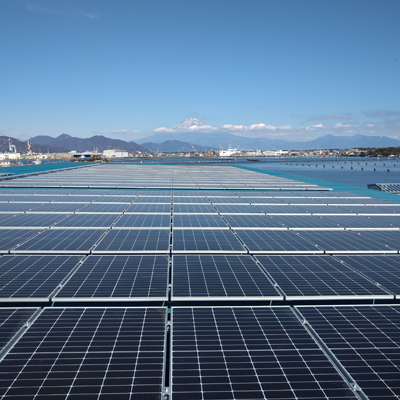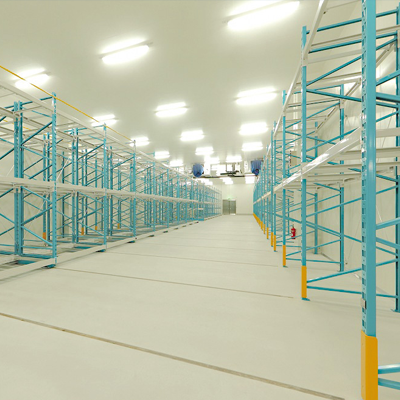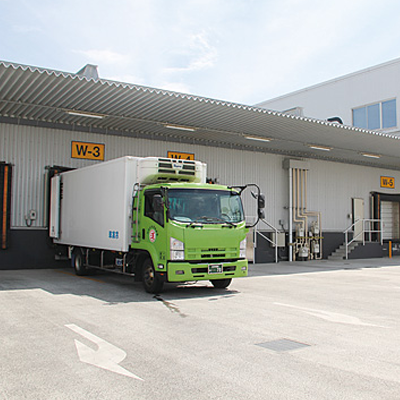Reduction of CO2 Emissions
Reduction of CO2 Emissions
As part of our climate change countermeasures, we recognize the reduction of greenhouse gas emissions, including CO2, as a critical environmental issue and are actively working to minimize our environmental impact.
Target
We have set a goal to reduce CO2 emissions by 50% in terms of basic unit*1 compared to the fiscal year FY2020. To achieve this, we are promoting the introduction of energy-efficient equipment, the use of renewable energy, and the review of store operations.
| Scope | FY2020 | FY2021 | FY2022 | FY2023 | FY2024 | |
|---|---|---|---|---|---|---|
| Emissions*2 (t-CO2) |
Scope 1 | 34,834 | 32,944 | 32,876 | 31,403 | 32,035 |
| Scope 2 | 100,853 | 90,986 | 90,877 | 90,634 | 94,076 | |
| Total | 135,687 | 123,929 | 123,753 | 122,037 | 126,111 | |
| Emissions (Intensity) |
Scope 1 | 0.140 | 0.139 | 0.117 | 0.103 | 0.099 |
| Scope 2 | 0.407 | 0.385 | 0.322 | 0.297 | 0.290 | |
| Total | 0.547 | 0.524 | 0.439 | 0.399 | 0.388 |
*1:Emissions per 1 million yen in revenue
*2:Scope: Domestic Group Scope 1 and 2
Scope 3 Emissions by Category (t-CO₂)
-
Category Description FY2024 1 Purchased goods and services 501,041 2 Capital goods 46,795 3 Fuel- and energy-related activities
(not included in scope 1 or scope 2)20,635 4 Upstream transportation and distribution 11,859 5 Waste generated in operations 4,747 6 Business travel 597 7 Employee commuting 3,541 8 Upstream leased assets N/A 9 Downstream transportation and distribution N/A 10 Processing of sold products N/A 11 Use of sold products N/A 12 End-of-life treatment of sold products N/A 13 Downstream leased assets N/A 14 Franchises 50,548 15 Investments N/A Total 639,763 * Rounded to the nearest decimal place
Initiatives
-
Promotion of Renewable Energy Use
The Group is actively promoting the use of renewable energy at all major factories, including our central kitchens, to reduce CO2 emissions.
As of January 2023, solar power generation systems were fully installed at five key factories under the management of COLOWIDE MD, which oversees the Group's merchandising. These systems generate approximately 970,000 kWh*1 of electricity annually,equivalent to the electricity consumption of about 247 households,*2 reducing annual CO2 emissions by around 375 tons as part of our proactive efforts to mitigate climate change.*1 Performance data from March 1, 2023 to February 29, 2024
*2 Calculated based on the Ministry of the Environment's Survey on the Actual Conditions of Carbon Dioxide Emissions from Residential Sector in FY2023 (Final Figures) 
-
Initiatives for Energy Conservation
As part of our initiatives for energy conservation, we are implementing measures to reduce CO2 emissions in our stores. These include converting all in-store lighting to LED across our group stores and replacing air conditioning systems with energy-efficient models during new store openings and renovations. Additionally, at Kappa Sushi, we have established clear rules regarding seasonal air conditioning settings and the on/off schedule for signboard lighting to reduce electricity consumption in our stores.
In our factories, we have introduced an Energy Management System (EMS) at the Kanagawa Central Kitchen (CK). The EMS enables the visualization of energy consumption, including electricity and gas usage, as well as CO2 emissions. It also features functions to measure and control factors such as temperature and humidity within the facility. Through this system, Kanagawa CK optimizes energy usage and promotes the reduction of environmental impact.
-
Reduction in Dry Ice Usage
We are working to reduce CO2 emissions by switching from dry ice, which has been used for refrigeration during product deliveries, to cooler shippers and refrigerants. As a result of these changes, we have reduced dry ice usage by approximately 99% compared to fiscal year 2020. We will continue with this initiative moving forward.
-
Use of Natural Refrigerants
One of the powerful greenhouse gases is certain fluorocarbons (CFCs). To prevent global warming, it is essential to reduce and control their emissions. In addition, mitigating the destruction of the ozone layer caused by the release of fluorocarbons and the harmful effects of increased ultraviolet radiation on ecosystems is also a critical issue. The COLOWIDE Group is actively addressing this issue by reducing the risk of fluorocarbon leakage through regular inspections of refrigeration equipment and transitioning to natural refrigerants. Currently, at the Nagahama Central Kitchen and Shizuoka Factory's refrigeration facilities, natural refrigerants (NH2/CO2) are used instead of fluorocarbons. Through efforts to reduce power consumption and lower greenhouse gas emissions, we are working to lessen our environmental impact.

-
Optimization of Logistics
COLOWIDE MD, which oversees the Group's merchandising, has signed a lead logistics partner agreement with Yamato Transport Co., Ltd., and is implementing a new logistics scheme to support the expansion of the catering service business. For our domestic food service business, we have also worked to reduce the frequency of deliveries to stores, transitioning from 7-day-a-week deliveries to 5 days a week in stages. Moving forward, we will continue to optimize the entire supply chain and aim to build a sustainable and environmentally friendly logistics system.







